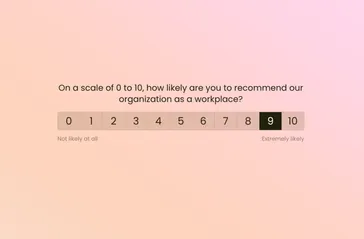7 min read
Empower employees while caring for employee well-being. Prevent employee burnout and depression.
ex Platform
We live in a candidate-oriented market, which gives job seekers a lot of choice regarding where they want to work. For example, in the United States, there are two job positions for every unemployed person. Job seekers often care about the candidate’s experience more than anything else. After all, it gives them insight into what working in your organization would look like, and ideally convinces them that you are the best team to join. This article will teach you what the candidate experience should include, how to build a positive candidate experience, and what best practices to apply to provide job candidates with an effective, comprehensive journey.
What is Candidate Experience?
Candidate experience is the comprehensive feelings, impressions, and interactions that a candidate has during the recruitment process with a given company. It’s not just a series of stages related to the application and qualification interviews, but also all the touchpoints between the candidate and the employer from the moment of interest in the job offer until the end of the recruitment process.In short, candidate experience includes everything that a candidate experiences, feels, and notices during interactions with the company - from the first contact with the job offer to the final employment or the end of the recruitment process. It is a key element of the recruitment strategy, as it affects not only whether candidates will decide to accept the job offer, but also the company’s image as an employer. Therefore, diligence, professionalism, and positive candidate experiences are key to building effective relationships with potential employees.
Why is Candidate Experience conducted?
Candidate Experience is a key element of the overall Employee Experience. It is not only a candidate’s point of contact with the company, but also the first step in building a long-term relationship between the employee and the employer. A good candidate experience impacts not only the moment of making the employment decision but also the further engagement of the employee in the company.Employee Experience is a holistic view of employee experiences during their entire life cycle in the company, and Candidate Experience is an integral beginning of this cycle. Employees who had positive experiences during recruitment often start their work with more enthusiasm and a positive attitude towards the company.
The candidate experience is a key element of the recruitment process, affecting the candidate’s well-being and the organization’s effectiveness. According to research, 58% of respondents believe a successful recruitment process significantly increases the chances of accepting a job offer.
Unsuccessful candidate experiences can generate time and resource losses, lower employee engagement, and harm the company’s reputation. It is especially important that as many as 72% of candidates who experienced negative situations in the recruitment process shared them online or with others.
Ultimately, negative experiences can result in the loss of valuable talents. Therefore, it is important for organizations to focus on creating a positive recruitment environment that not only attracts but also retains potential employees.
5 Key Benefits of Excellent Candidate Experience
Attracting Top Talent: Excellent Candidate Experience is a magnet for the most talented people in the market. Candidates are looking for a company that offers an interesting position and ensures that the recruitment process is smooth, professional, and friendly. Positive experiences during recruitment make your company an attractive place to work.
Building a Positive Employer Image: Candidates with excellent candidate experience often share their positive impressions with others. This builds a positive image of the company as an employer, attracting more talent. The word about professionalism and respect during recruitment quickly spreads in the industry.
Increased Loyalty and Engagement: When candidates have positive experiences, they are more likely to engage with the company longer. Even if they are not hired, positive impressions from the recruitment process may make them more willing to return in the future or recommend the company to others. This builds lasting relationships.
Recruitment Process Efficiency: Excellent Candidate Experience usually requires better organization of recruitment processes. By ensuring clear communication, quick responses, and transparency, the company improves candidate impressions and increases the efficiency of its recruitment actions.
Recruitment Cost Reduction: By minimizing chaos, shortening the duration of the recruitment process, and increasing effectiveness, Candidate Experience can contribute to reducing recruitment costs. Less time spent on searching for candidates who resign from the process and lower employee turnover lead to financial savings for the company.
In short, Candidate Experience is an investment in the company’s future, the ability to attract and retain the best talents, and building a strong employer brand. It is not only a benefit for candidates but also for the company itself, which builds positive relationships and effectively manages the recruitment process.
What is important during the recruitment process?
Building a positive Candidate Experience is a process that covers different stages of recruitment. Here are some key steps that will help you create a friendly environment for candidates:
Clear and Transparent Communication: Provide clear information regarding expectations for the position and the recruitment process. Keep candidates informed about progress in the recruitment process and any changes in the schedule.
Appropriate Recruitment Tools: Use modern recruitment tools that make it easier for candidates to apply and track progress. Make sure that the systems are intuitive and adapted to various devices to facilitate candidates’ access to information.
Defined Stages of the Recruitment Process: Construct a clear plan of recruitment stages, from application to the end of the process. Inform candidates about what awaits them at each stage so that they can prepare accordingly.
Personal Contact and Respect: Personalize communication, avoid standard templates, and treat candidates individually. Respect candidates’ time by providing them with information about their participation in the process, even if they do not qualify for the next stage.
Effective Communication of the Recruitment Team: Make sure that the recruitment team is properly trained in communicating with candidates. Encourage team coordination to maintain consistency and professionalism at each stage.
Feedback after the Process: Provide constructive feedback to candidates, especially those who were not selected. If possible, offer feedback that will help candidates develop professionally.
Candidate Satisfaction Surveys: Conduct Candidate Experience surveys or conversations with candidates after the recruitment process to get feedback on their experiences. Use this information for continuous improvement of the recruitment process.
Considering the Length of the Process: Avoid excessively prolonging the recruitment process. A long waiting time can discourage candidates. Try to maintain a balance between the accuracy of assessments and the efficiency of the process.
Caring for the Employer Brand: Implement strategies highlighting positive candidate experiences as part of employer marketing. Promote positive stories of candidates who have been hired in your company.
Continuous Improvement: Regularly analyze candidate feedback and adjust the recruitment process according to their needs. Be flexible and ready to adapt to changing job market expectations.
By considering these steps in the recruitment process, you will build a positive Candidate Experience, which will contribute to increasing the attractiveness of your company as an employer.
Best Practices for Candidate Experience
Best practices related to candidate experience are based on principles of simplicity, innovation, and effective communication. Here’s a closer look at practices worth considering when creating and implementing a positive candidate experience in the company.
Be Technologically Modern:
Practice: Use technology to make the candidate experience more modern and increase their comfort.
Example: Implementing mobile technologies, such as text messages or chatbots, to enable candidates to easily schedule phone calls and receive personalized information about the recruitment process.Communicativeness and Engaging Contact:
Practice: Regular and consistent communication with candidates, informing them about progress in the recruitment process.
Example: Providing clear information about recruitment decisions and offering constructive feedback even in the case of rejecting a candidate.Strong Employer Brand:
Practice: Building and maintaining a strong company brand to attract the right candidates.
Example: Promoting the company’s values, personality, and culture via social media and a website to attract employees who fit the company.Educating Candidates:
Practice: Providing information about the company and answering candidates’ questions even before submitting an application.
Example: Creating educational content on the website and in social media, presenting the company’s culture, vision, mission, and benefits package.Transparency and FAQ:
Practice: Providing transparency and answers to potential questions from candidates even before the recruitment process.
Example: Developing frequently asked questions (FAQ) for potential candidates, increasing transparency, and engaging candidates.
How Can Online Surveys Help in Building a Positive Candidate Experience?
Almost 60% of job seekers have bad experiences with candidates. So, where are the companies making mistakes? Sometimes, it comes down to a lack of organization and inappropriate systems. Whether you want to create and send Candidate Experience surveys, plan qualification interviews or share processes among team members, online surveys are an effective tool that can significantly improve candidate experience during the recruitment process.
Sign up for a free account and create a Candidate Experience survey to learn about your candidates’ experiences throughout recruitment and build a strong employer brand.






